The News

A think tank organized by Trump administration alums is declining to back a national abortion ban in its new book outlining a potential policy platform for Republicans heading into the 2024 presidential cycle.
The tract by the America First Policy Institute offers one of the first detailed previews of what the agenda might look like in a second Trump White House, though the organization has said it hopes other potential GOP candidates at the state and federal level might adopt its ideas. More than 50 senior Trump administration officials offered input into the publication, according to the group.
In this article:
Shelby and Jordan’s View
While Trump himself has never exactly been known as a policy wonk, the ideas contained in the book could prove to be significant, since its authors may shape the priorities of Republican officials and staff in the next administration.
Republicans have struggled with how to position themselves on abortion since the Supreme Court overturned Roe v. Wade earlier this year, with some leading figures, like Sen. Lindsay Graham, R-S.C. advocating a national ban, and others suggesting the issue should be left to the states. The new book appears to, at least tacitly, side with the latter camp.
“In its decision in Dobbs v. Jackson Women’s Health Organization, the Supreme Court pushed the issue of abortion rightfully back to the states, presenting an opportunity for ‘we the people’ to pass state legislation protecting life,” the book says. On the federal level, it argues Republicans should fight to maintain the Hyde Amendment, which bans Washington from funding abortion services, while ending support for Planned Parenthood.
As for those state-level efforts, the book advocates legislation ending “late-term abortions,” though it notably doesn’t define the term, making no mention of how many weeks into a pregnancy the procedure should be banned.
Here are some of the other notable policy recommendations — and omissions:
HEALTH CARE
On health care, the think tank doesn’t call for Republicans to repeal the Affordable Care Act outright. Trump’s attempts to end the law in 2017 caused deep backlash that helped cost the party its House majority in the following midterms. However, it still advocates cutting massive holes into the statute, by letting states decide which policies insurers can sell instead of relying on federal standards, and ending the requirement that large employers provide coverage to their workers, among other major changes.
SPENDING
One of Donald Trump’s major innovations as a Republican candidate was his promise not to cut Social Security or Medicare, though he later backtracked on a similar pledge not to target Medicaid. The AFPI book seems to take a more traditional conservative position, albeit obliquely. It calls for the next president to “address unsustainable mandatory spending growth” by “modernizing and preserving key programs that senior citizens and vulnerable populations rely on.”
THE ‘DEEP STATE’
By the end of the Trump administration, the White House had begun taking steps that would have allowed it to fire civil servants and hire more politically sympathetic replacements, an idea that has since been adopted as a top priority by a broad swath of allies. The new book argues that the next administration should pick that effort back up, both through efforts that would require legislation, and by using “executive branch authorities to make significant portions of the federal workforce at-will.” It also suggests moving more federal agencies, including the IRS and FBI, out of Washington, D.C.
CULTURE WARS
While sparse on abortion, the think tank leans into other culture war fights, with a particular emphasis on recent conservative preoccupations such as transgender athletes in women’s sports, education, and big tech censorship. AFPI’s book includes an entire section dedicated towards giving “parents more control over the education of their children,” and includes initiatives like school choice.
On tech, the book argues that social media platforms should only receive so-called Section 230 protections, which shield them from lawsuits over user content, if they act as “common carriers” that don’t discriminate based on viewpoint — a position that has become increasingly popular among conservatives in recent years. However, AFPI goes further, suggesting that even without legislation, the Federal Communications Commission could “narrow” section 230 protections for companies that engage in “bad faith” content moderation.
THE WALL
Trump officials at the think tank remain focused on building the former president’s border wall, and the booklet calls for lawmakers to back policies that will aid in finishing its construction. At the state level, AFPI adds that expanding on “non-wall buffers” along the border and “waterways on the U.S. side of the Rio Grande River” should remain a focus for “America First” lawmakers. Finishing the wall is the first in a series of policy proposals focused on immigration, human trafficking, and drug cartels.
The book calls for a revamped “merit-based” system of legal immigration, tighter requirements to prevent guest workers from displacing American labor, and expanded requirements at the state level to use “E-Verify” to check workers’ legal status. More far-reaching proposals from Trump allies, like major across-the-board cuts to legal immigration, don’t make the cut.
Room for Disagreement
Distilling Trump into a policy platform has always been difficult given that he’s not known as a wonk and has a history of changing positions on key issues without warning. Some observers argue it’s pointless to try, given his own personal charisma and celebrity is more important to his appeal and impossible to replicate with other candidates. The New York Times Jane Coaston has long argued “Trumpism” is too nebulous to define in terms of issue positions.
